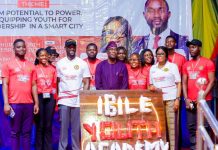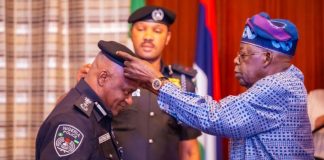Lagos State Governor, Babajide Olusola Sanwo-Olu, has reiterated the imperative need for Lagos State to be granted a Special Status, given its pivotal role in driving Nigeria’s economic growth and its significant contributions to the well-being of the citizens.
Sanwo-Olu stated this on Tuesday, while welcoming the leadership and members of the Revenue Mobilization Allocation and Fiscal Commission (RMAFC) at the Opening Session of the Commission’s On-the-Spot Assessment Visit to the state, held at the Banquet Hall, Lagos House, Ikeja, adding that such a request has become imperative owing to the strategic position of the state, especially with the burdens it bears.
The Governor, who was represented by his Deputy, Dr. Kadri Obafemi Hamzat, described the visit of the commission as a significant milestone in the continued efforts of the Federal Government to ensure a more transparent, equitable, and fairness in distribution of the nation’s resources, but underscored that Nigerians need to start acting with functionality and not with emotions.
He noted that “if it is truly recorded that Lagos generates 33 percent of the GDP in the country, it means that the state’s efforts correlated with the progress of the country. So we should not be emotional about it. We should act rightly as is done in every other part of the world.
“For example, if we look at the Apapa and Tin-Can ports, which are responsible for almost 89.9 per cent of the importation of goods into the country, it ought to take care of almost a 20-kilometer radius around them, as is being done in other climes with familiar amenities. But that is not the case herein Lagos, where its government does everything from road maintenance to other infrastructure.”
While buttressing his point, Sanwo-Olu noted that a suppression of the amenities to Lagos citizens would be harmful to the state and would eventually affect the country and the economy. He noted that every Nigerian is represented in Lagos, and the Federal Government must put things into perspective in the country and prevent national devastation.
Speaking further, the governor stressed the need for the RMAFC to ensure recognition of the 37 Local Council Development Areas (LCDAs) in their revenue allocation, adding that these LCDAs, since their creation in 2003, have succeeded in bringing governance closer to the people, accelerating grassroots development in the state, and therefore need to be recognized.
Sanwo-Olu noted that effective revenue mobilization is essential for sustaining the nation’s development goals and ensuring that the government provides the services communities rely on, stating that the financial landscape Lagos operates within is complex and ever-evolving.
In his remark, Federal Commissioner of Revenue Mobilization, Allocation and Fiscal Commission, Prof. Adekunle Wright said that the visit of the commission to the state is anchored on the request of the Lagos State Government’s presentation to be granted the support for stabilization fund for the delivery of crucial infrastructure projects in the state.
According to Prof. Wright, “The commission is in Lagos to evaluate the solicitation presented, and I am emphasizing our commitment to building transparent, data-driven processes and fair criteria in resource allocation across the country, while ensuring the land’s natural resources are equitably disposed of for maximum impact to all.”
He acknowledged the challenges facing Lagos, affirming that the commission is dedicated to advocating continued support towards the development of the state, recognizing the vital role of Lagos as the economic hub of Nigeria.
Earlier in his welcome address, Commissioner for Finance, Mr. Abavomi Oluyomi, emphasized the importance of monitoring statutory allocation to state and local governments to ensure proper planning and sustainable management of the nation’s resources.
Oluyomi noted that the mandate of the Revenue Mobilization Allocation and Fiscal Commission (RMAFC) is to support the creation of a safe and prosperous society through transparent and income-based reviews, which is only achievable through strong cooperation and collaboration between the federal and state governments.
The Commissioner, therefore, called for the Commission’s continued support of the strengthening of Lagos State’s budgeting and development framework. He stated that Lagos has committed over 1.1 trillion to infrastructure and development, adding that the state has an infrastructure gap of over 20 trillion megawatts in areas such as security, water, sanitation, food, education, health, and social housing.
According to him, “As we take the site where sanitation costs are to be utilized. The initiative and projects not only hold the promise of economic and social stability, but they also help establish the quality of life for our citizens and support the right to prosperity.”
Oluyomi added that it is a well-known fact that Lagos’ Gross Domestic Product (GDP) is one-half of Nigeria’s economy; therefore, whatever affects Lagos will affect the whole nation.















